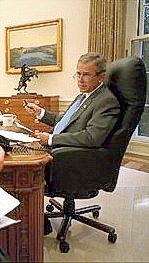In a decision that's drawing outrage from U.S. steel producers, U.S. President George W. Bush today announced he's scrapping the tariffs he imposed last year on imported steel. The import tariffs, originally intended to remain in effect until 2005, are no longer needed because of changed economic circumstances, the President said.
"I strongly believe that America's workers can compete with anyone in the world as long as we have a fair and level playing field," Bush said in a statement read to reporters by White House spokesman Scott McClellan.
United Steelworkers of America President Leo Gerard termed the announcment a "sorry betrayal of American Steelworkers and steel communities."
To read the full text of the American USWA statement, click here.
As partners in the North American Free Trade Agreement, Canada and Mexico were exempt from the tariffs.
The following is the full text of the White House statement:
**************************************************************** Statement by the President
Today, I signed a proclamation ending the temporary steel safeguard measures I put in place in March 2002. Prior to that time, steel prices were at 20-year lows, and the U.S. International Trade Commission found that a surge in imports to the U.S. market was causing serious injury to our domestic steel industry. I took action to give the industry a chance to adjust to the surge in foreign imports and to give relief to the workers and communities that depend on steel for their jobs and livelihoods. These safeguard measures have now achieved their purpose, and as a result of changed economic circumstances it is time to lift them.
The U.S. steel industry wisely used the 21 months of breathing space we provided to consolidate and restructure. The industry made progress increasing productivity, lowering production costs, and making America more competitive with foreign steel producers. Steel producers and workers have negotiated new groundbreaking labor agreements that allow greater flexibility and increase job stability. The Pension Benefit Guaranty Corporation has guaranteed the pensions of eligible steelworkers and retirees and relieved the high pension costs that burdened some companies. My jobs and growth plan has also created more favorable economic conditions for the industry, and the improving economy will help further stimulate demand.
To keep the positive momentum going, we will continue our steel import licensing and monitoring program so that my Administration can quickly respond to future import surges that could unfairly damage the industry. We will continue negotiations with our trading partners through the Organization of Economic Cooperation and Development to establish new and stronger disciplines on subsidies that governments grant to their steel producers. We will continue to pursue economic policies that create the conditions for steel producers, steel consumers -- who rely on steel to produce goods ranging from refrigerators to auto parts - and other U.S. manufacturers to succeed.
I strongly believe that America's workers can compete with anyone in the world as long as we have a fair and level playing field. Free trade opens foreign markets to American products and creates jobs for American workers, and an integral part of our commitment to free trade is our commitment to enforcing our trade laws. I am pleased the steel industry seized the opportunity we provided to regain its competitiveness and assist steelworkers and their communities. As a result, U.S. steel companies are now once again well-positioned to compete both at home and globally.
**************************************************************** To read the full text of the presidential proclamation, please click here.
